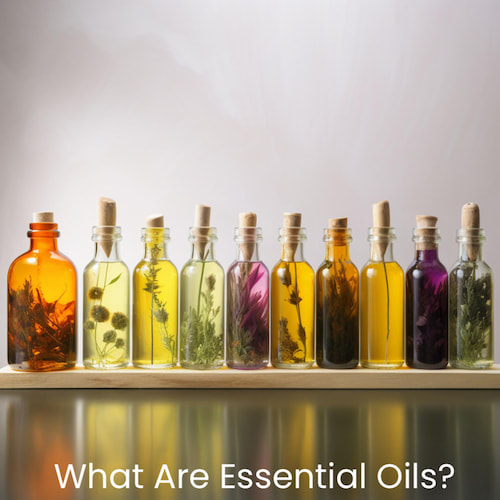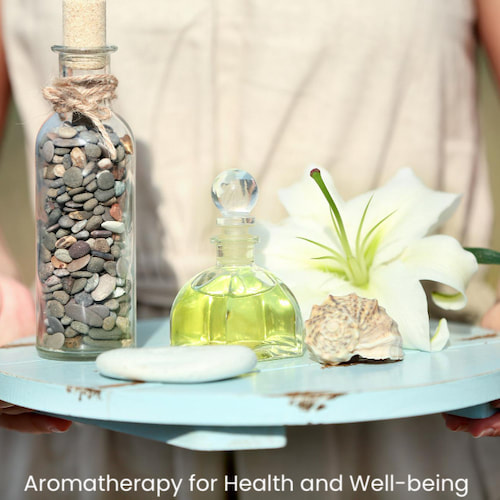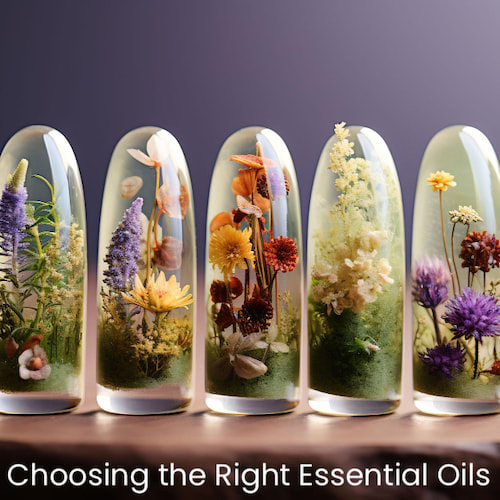Aromatherapy in Daily Life
Aromatherapy, the practice of using essential oils and their pleasant scents to promote overall well-being, has been a part of various cultures for centuries. In recent times, it has gained significant popularity as an alternative and complementary therapy. The use of aromatherapy in daily life has become a common practice for relaxation, stress relief, and improving one's mental and physical health.
One of the key aspects of aromatherapy is its ability to reduce stress and anxiety. In today's fast-paced world, stress has become a constant companion for many people. Aromatherapy offers a natural and effective way to relax and unwind. Scents like lavender, chamomile, and bergamot are known for their calming properties. Diffusing these essential oils in the home or workplace can create a soothing atmosphere, helping to alleviate stress and anxiety.
Moreover, aromatherapy is widely used to enhance mood and uplift spirits. Citrus oils such as lemon, orange, and grapefruit are known for their refreshing and energizing aroma. Inhaling these scents can boost mood and increase feelings of positivity. Aromatherapy can be particularly beneficial on gloomy days or during times when one feels emotionally low, providing a natural and pleasant way to improve one's outlook on life.
Aromatherapy is also employed to improve sleep quality. Many people suffer from insomnia or have trouble falling asleep due to various reasons such as stress, anxiety, or irregular sleep patterns. Essential oils like lavender and chamomile have sedative properties that can promote relaxation and create a conducive environment for sleep. Using a diffuser with these oils in the bedroom can help create a calming bedtime ritual, improving the quality of sleep and overall well-being.
In addition to its mental and emotional benefits, aromatherapy can also have positive effects on physical health. Certain essential oils possess antibacterial and antiviral properties, making them useful in maintaining a healthy environment. Tea tree oil, for example, is renowned for its antimicrobial properties and is commonly used in cleaning products to disinfect surfaces naturally.
Furthermore, aromatherapy can aid in relieving various physical ailments. Peppermint oil is well-known for its ability to alleviate headaches and migraines. When applied topically or inhaled, it can provide quick relief from tension headaches. Eucalyptus oil is widely used for respiratory issues. Inhaling its vapors can help clear nasal congestion and improve breathing, making it particularly beneficial during colds and allergies.
Aromatherapy is not limited to home use; it has found its way into various professional settings. Many spas and wellness centers incorporate aromatherapy into their treatments, enhancing the overall relaxation experience for their clients. Additionally, some healthcare practitioners use aromatherapy as a complementary therapy to support traditional medical treatments, especially in managing chronic pain, nausea, and other symptoms.
In conclusion, aromatherapy has become an integral part of daily life for many individuals seeking natural and holistic approaches to enhance their well-being. Its wide-ranging benefits, including stress reduction, mood enhancement, improved sleep, and physical health support, make it a valuable practice in today's hectic world. By incorporating aromatherapy into daily routines, people can enjoy a more balanced and harmonious life, both mentally and physically.
One of the key aspects of aromatherapy is its ability to reduce stress and anxiety. In today's fast-paced world, stress has become a constant companion for many people. Aromatherapy offers a natural and effective way to relax and unwind. Scents like lavender, chamomile, and bergamot are known for their calming properties. Diffusing these essential oils in the home or workplace can create a soothing atmosphere, helping to alleviate stress and anxiety.
Moreover, aromatherapy is widely used to enhance mood and uplift spirits. Citrus oils such as lemon, orange, and grapefruit are known for their refreshing and energizing aroma. Inhaling these scents can boost mood and increase feelings of positivity. Aromatherapy can be particularly beneficial on gloomy days or during times when one feels emotionally low, providing a natural and pleasant way to improve one's outlook on life.
Aromatherapy is also employed to improve sleep quality. Many people suffer from insomnia or have trouble falling asleep due to various reasons such as stress, anxiety, or irregular sleep patterns. Essential oils like lavender and chamomile have sedative properties that can promote relaxation and create a conducive environment for sleep. Using a diffuser with these oils in the bedroom can help create a calming bedtime ritual, improving the quality of sleep and overall well-being.
In addition to its mental and emotional benefits, aromatherapy can also have positive effects on physical health. Certain essential oils possess antibacterial and antiviral properties, making them useful in maintaining a healthy environment. Tea tree oil, for example, is renowned for its antimicrobial properties and is commonly used in cleaning products to disinfect surfaces naturally.
Furthermore, aromatherapy can aid in relieving various physical ailments. Peppermint oil is well-known for its ability to alleviate headaches and migraines. When applied topically or inhaled, it can provide quick relief from tension headaches. Eucalyptus oil is widely used for respiratory issues. Inhaling its vapors can help clear nasal congestion and improve breathing, making it particularly beneficial during colds and allergies.
Aromatherapy is not limited to home use; it has found its way into various professional settings. Many spas and wellness centers incorporate aromatherapy into their treatments, enhancing the overall relaxation experience for their clients. Additionally, some healthcare practitioners use aromatherapy as a complementary therapy to support traditional medical treatments, especially in managing chronic pain, nausea, and other symptoms.
In conclusion, aromatherapy has become an integral part of daily life for many individuals seeking natural and holistic approaches to enhance their well-being. Its wide-ranging benefits, including stress reduction, mood enhancement, improved sleep, and physical health support, make it a valuable practice in today's hectic world. By incorporating aromatherapy into daily routines, people can enjoy a more balanced and harmonious life, both mentally and physically.
Aromatic Self-Care: Incorporating Aromatherapy into Your Routine
In the hustle and bustle of modern life, taking care of oneself often takes a back seat. Amidst deadlines, responsibilities, and the constant demands of the digital age, it’s crucial to find moments of tranquility and relaxation. Aromatic self-care, specifically through the art of aromatherapy, offers a fragrant pathway to holistic well-being, allowing individuals to rejuvenate both their body and mind.
At its core, aromatherapy is the practice of using essential oils extracted from plants to promote physical, emotional, and mental well-being. These oils, derived from flowers, leaves, roots, and other plant parts, are known for their therapeutic properties. Incorporating aromatherapy into your daily routine can transform your self-care rituals into sensory experiences that nourish the soul.
Morning Energizer: Start your day with a burst of energy by incorporating aromatherapy into your morning routine. Essential oils like citrusy bergamot or invigorating peppermint can be diffused while you’re getting ready, creating a refreshing ambiance. Inhaling these scents can awaken your senses, preparing you for the day ahead with a positive mindset.
Midday Stress Relief: Midday stress is a common issue for many. Instead of reaching for that extra cup of coffee, opt for a natural remedy. Aromatherapy diffusers in your workspace with calming scents like lavender or chamomile can help reduce stress and anxiety, enhancing your focus and productivity. Taking short breaks to inhale these fragrances can provide instant relaxation, allowing you to tackle challenges with a clear mind.
Evening Wind-Down: As the day comes to a close, it’s essential to unwind and prepare your body for restful sleep. Aromatic self-care in the evening can be transformative. Soothing oils such as lavender, ylang-ylang, or cedarwood can be diffused in your bedroom. The calming aroma can signal your body that it’s time to relax, promoting better sleep quality. You can also add a few drops of these oils to a warm bath, creating a luxurious, spa-like experience at home.
Weekend Retreat: Aromatherapy can elevate your weekend self-care rituals. Create a serene atmosphere by diffusing your favorite essential oils while practicing yoga, meditation, or reading a book. Oils like frankincense or sandalwood are excellent choices for enhancing spiritual practices, creating a peaceful ambiance that aids in mindfulness and introspection.
DIY Aromatic Treatments: Incorporate aromatherapy into your beauty and skincare routines. Create your own natural perfumes, facial mists, or massage oils using essential oils. Not only do these products smell divine, but they also offer therapeutic benefits for your skin and overall well-being. For example, tea tree oil can be added to your skincare routine for its antibacterial properties, while rose oil can be used for its hydrating and anti-aging effects.
Aromatic self-care through aromatherapy is a luxurious and accessible way to prioritize your well-being. By integrating these delightful scents into your daily routine, you’re not only caring for your physical and mental health but also indulging in moments of pure bliss amidst the chaos of life. Whether you’re seeking relaxation, energy, focus, or simply a moment of tranquility, aromatherapy offers a fragrant sanctuary for your body and soul, reminding you of the importance of self-love and self-care in every inhalation.
At its core, aromatherapy is the practice of using essential oils extracted from plants to promote physical, emotional, and mental well-being. These oils, derived from flowers, leaves, roots, and other plant parts, are known for their therapeutic properties. Incorporating aromatherapy into your daily routine can transform your self-care rituals into sensory experiences that nourish the soul.
Morning Energizer: Start your day with a burst of energy by incorporating aromatherapy into your morning routine. Essential oils like citrusy bergamot or invigorating peppermint can be diffused while you’re getting ready, creating a refreshing ambiance. Inhaling these scents can awaken your senses, preparing you for the day ahead with a positive mindset.
Midday Stress Relief: Midday stress is a common issue for many. Instead of reaching for that extra cup of coffee, opt for a natural remedy. Aromatherapy diffusers in your workspace with calming scents like lavender or chamomile can help reduce stress and anxiety, enhancing your focus and productivity. Taking short breaks to inhale these fragrances can provide instant relaxation, allowing you to tackle challenges with a clear mind.
Evening Wind-Down: As the day comes to a close, it’s essential to unwind and prepare your body for restful sleep. Aromatic self-care in the evening can be transformative. Soothing oils such as lavender, ylang-ylang, or cedarwood can be diffused in your bedroom. The calming aroma can signal your body that it’s time to relax, promoting better sleep quality. You can also add a few drops of these oils to a warm bath, creating a luxurious, spa-like experience at home.
Weekend Retreat: Aromatherapy can elevate your weekend self-care rituals. Create a serene atmosphere by diffusing your favorite essential oils while practicing yoga, meditation, or reading a book. Oils like frankincense or sandalwood are excellent choices for enhancing spiritual practices, creating a peaceful ambiance that aids in mindfulness and introspection.
DIY Aromatic Treatments: Incorporate aromatherapy into your beauty and skincare routines. Create your own natural perfumes, facial mists, or massage oils using essential oils. Not only do these products smell divine, but they also offer therapeutic benefits for your skin and overall well-being. For example, tea tree oil can be added to your skincare routine for its antibacterial properties, while rose oil can be used for its hydrating and anti-aging effects.
Aromatic self-care through aromatherapy is a luxurious and accessible way to prioritize your well-being. By integrating these delightful scents into your daily routine, you’re not only caring for your physical and mental health but also indulging in moments of pure bliss amidst the chaos of life. Whether you’re seeking relaxation, energy, focus, or simply a moment of tranquility, aromatherapy offers a fragrant sanctuary for your body and soul, reminding you of the importance of self-love and self-care in every inhalation.
Aromatherapy for Travel: Staying Balanced on the Go
Traveling can be both exhilarating and stressful, and maintaining a sense of balance and well-being on the go is essential. Aromatherapy offers a natural and effective way to stay grounded, relaxed, and refreshed during your travels. Whether you're embarking on a long-haul flight, road trip, or a busy itinerary, integrating aromatherapy into your travel routine can make a significant difference in how you experience your journeys.
1. Portable Aromatherapy: Invest in portable aromatherapy tools such as personal inhalers or roll-on bottles filled with your favorite essential oil blends. These compact and travel-friendly options allow you to carry the soothing scents of essential oils wherever you go. Inhaling calming oils like lavender or chamomile during stressful moments, such as flight delays or crowded places, can provide instant relaxation.
2. Jet Lag Relief: Jet lag is a common challenge for travelers crossing multiple time zones. Aromatherapy can assist in resetting your internal clock and alleviating the symptoms of jet lag. Essential oils like peppermint and lemon are known for their revitalizing effects. Inhale these scents or use them in a diffuser in your hotel room to combat fatigue and promote mental clarity.
3. Calming Travel Anxiety: Travel anxiety is a common concern, especially for those with a fear of flying or traveling to unfamiliar places. Aromatherapy oils such as bergamot, ylang-ylang, and frankincense are excellent for reducing anxiety and promoting relaxation. Diffusing these oils in your hotel room or using them in a calming massage oil can help ease travel-related stress.
4. Immune Support: Travel exposes you to various environments and potential germs. Essential oils like tea tree, eucalyptus, and lemon have natural antibacterial and antiviral properties. Using these oils in a personal hand sanitizer or inhaling their vapors can support your immune system and keep you feeling refreshed during your travels.
5. Relieving Motion Sickness: For individuals prone to motion sickness during car rides or flights, ginger and peppermint essential oils can be incredibly helpful. Inhaling these oils or applying them to acupressure points, such as wrists or temples, can alleviate nausea and discomfort associated with motion sickness.
6. Creating a Comforting Sleep Environment: Quality sleep is essential, especially when traveling across different time zones. Lavender, chamomile, and cedarwood essential oils are renowned for their sleep-inducing properties. Diffusing these oils in your hotel room or using them on your pillow can create a relaxing sleep environment, promoting deep and restful sleep.
7. Refreshing Energy Levels: Long hours of travel and sightseeing can leave you feeling fatigued. Citrus oils like lemon, orange, and grapefruit are excellent for boosting energy and revitalizing the mind. Inhale these uplifting scents or use them in a portable diffuser to recharge your energy levels and stay alert during your adventures.
Incorporating aromatherapy into your travel routine can greatly enhance your overall travel experience. Whether you're seeking relaxation, mental clarity, immune support, or relief from travel-related discomfort, essential oils offer a natural and holistic solution. By carrying a small kit of your favorite oils and investing in portable aromatherapy tools, you can create a sense of balance and well-being wherever your travels take you, ensuring that you make the most out of your journey.
1. Portable Aromatherapy: Invest in portable aromatherapy tools such as personal inhalers or roll-on bottles filled with your favorite essential oil blends. These compact and travel-friendly options allow you to carry the soothing scents of essential oils wherever you go. Inhaling calming oils like lavender or chamomile during stressful moments, such as flight delays or crowded places, can provide instant relaxation.
2. Jet Lag Relief: Jet lag is a common challenge for travelers crossing multiple time zones. Aromatherapy can assist in resetting your internal clock and alleviating the symptoms of jet lag. Essential oils like peppermint and lemon are known for their revitalizing effects. Inhale these scents or use them in a diffuser in your hotel room to combat fatigue and promote mental clarity.
3. Calming Travel Anxiety: Travel anxiety is a common concern, especially for those with a fear of flying or traveling to unfamiliar places. Aromatherapy oils such as bergamot, ylang-ylang, and frankincense are excellent for reducing anxiety and promoting relaxation. Diffusing these oils in your hotel room or using them in a calming massage oil can help ease travel-related stress.
4. Immune Support: Travel exposes you to various environments and potential germs. Essential oils like tea tree, eucalyptus, and lemon have natural antibacterial and antiviral properties. Using these oils in a personal hand sanitizer or inhaling their vapors can support your immune system and keep you feeling refreshed during your travels.
5. Relieving Motion Sickness: For individuals prone to motion sickness during car rides or flights, ginger and peppermint essential oils can be incredibly helpful. Inhaling these oils or applying them to acupressure points, such as wrists or temples, can alleviate nausea and discomfort associated with motion sickness.
6. Creating a Comforting Sleep Environment: Quality sleep is essential, especially when traveling across different time zones. Lavender, chamomile, and cedarwood essential oils are renowned for their sleep-inducing properties. Diffusing these oils in your hotel room or using them on your pillow can create a relaxing sleep environment, promoting deep and restful sleep.
7. Refreshing Energy Levels: Long hours of travel and sightseeing can leave you feeling fatigued. Citrus oils like lemon, orange, and grapefruit are excellent for boosting energy and revitalizing the mind. Inhale these uplifting scents or use them in a portable diffuser to recharge your energy levels and stay alert during your adventures.
Incorporating aromatherapy into your travel routine can greatly enhance your overall travel experience. Whether you're seeking relaxation, mental clarity, immune support, or relief from travel-related discomfort, essential oils offer a natural and holistic solution. By carrying a small kit of your favorite oils and investing in portable aromatherapy tools, you can create a sense of balance and well-being wherever your travels take you, ensuring that you make the most out of your journey.
Aromatic Home Cleaning: A Fresh Approach to Household Chores
Traveling, while exhilarating, can also be demanding on the body and mind. Whether you’re embarking on a hectic business trip or a leisurely vacation, maintaining a sense of balance and well-being is essential. Aromatherapy, with its natural and holistic approach, provides a portable and effective solution to keep you grounded and relaxed while on the move.
Portable Relaxation: One of the challenges of travel is being away from your familiar, comforting environment. Aromatherapy offers a portable solution to create a sense of home wherever you go. Travel-sized essential oil diffusers are readily available, allowing you to diffuse your favorite scents in hotel rooms, Airbnb accommodations, or even in your car. The familiar aroma can instantly relax your mind, making your temporary space more inviting and calming.
Combatting Travel Stress: Travel often involves dealing with various stressors such as flight delays, jet lag, and unfamiliar surroundings. Essential oils like lavender, chamomile, and bergamot are renowned for their stress-relieving properties. Carrying a small vial of these oils allows you to inhale their calming scents during stressful situations. Inhaling these fragrances can help lower cortisol levels, easing anxiety and promoting mental clarity.
Jet Lag Relief: Crossing time zones can wreak havoc on your internal clock, resulting in jet lag. Aromatherapy can aid in resetting your circadian rhythm. Essential oils such as peppermint and eucalyptus can be used to invigorate and awaken your senses, helping you stay alert during the day. In the evening, calming scents like lavender and sandalwood can be diffused to promote relaxation and induce restful sleep, assisting your body in adjusting to the new time zone.
Immune Support: Traveling often exposes you to different environments and germs. Aromatherapy can support your immune system. Essential oils like tea tree, lemon, and eucalyptus have potent antimicrobial properties. A few drops of these oils in a travel-friendly hand sanitizer or in a personal inhaler can act as a natural defense against airborne pathogens, reducing the risk of falling ill during your journey.
Emotional Balance: Being away from home, especially for an extended period, can trigger feelings of homesickness or loneliness. Aromatherapy can provide emotional support and uplift your spirits. Citrus oils such as orange and lemon are known for their mood-enhancing properties. Inhaling these refreshing scents can boost your mood and create a positive atmosphere, helping you combat feelings of homesickness and fostering emotional balance.
Aromatherapy serves as a versatile and practical companion for travelers, offering a wide array of benefits. By incorporating essential oils into your travel routine, you can mitigate stress, combat jet lag, support your immune system, and maintain emotional balance. Whether you're on a short business trip or an extended vacation, aromatherapy provides a fragrant sanctuary that helps you stay grounded, relaxed, and in harmony with your surroundings, ensuring that your travel experiences are not only enriching but also rejuvenating for your body and soul.
Portable Relaxation: One of the challenges of travel is being away from your familiar, comforting environment. Aromatherapy offers a portable solution to create a sense of home wherever you go. Travel-sized essential oil diffusers are readily available, allowing you to diffuse your favorite scents in hotel rooms, Airbnb accommodations, or even in your car. The familiar aroma can instantly relax your mind, making your temporary space more inviting and calming.
Combatting Travel Stress: Travel often involves dealing with various stressors such as flight delays, jet lag, and unfamiliar surroundings. Essential oils like lavender, chamomile, and bergamot are renowned for their stress-relieving properties. Carrying a small vial of these oils allows you to inhale their calming scents during stressful situations. Inhaling these fragrances can help lower cortisol levels, easing anxiety and promoting mental clarity.
Jet Lag Relief: Crossing time zones can wreak havoc on your internal clock, resulting in jet lag. Aromatherapy can aid in resetting your circadian rhythm. Essential oils such as peppermint and eucalyptus can be used to invigorate and awaken your senses, helping you stay alert during the day. In the evening, calming scents like lavender and sandalwood can be diffused to promote relaxation and induce restful sleep, assisting your body in adjusting to the new time zone.
Immune Support: Traveling often exposes you to different environments and germs. Aromatherapy can support your immune system. Essential oils like tea tree, lemon, and eucalyptus have potent antimicrobial properties. A few drops of these oils in a travel-friendly hand sanitizer or in a personal inhaler can act as a natural defense against airborne pathogens, reducing the risk of falling ill during your journey.
Emotional Balance: Being away from home, especially for an extended period, can trigger feelings of homesickness or loneliness. Aromatherapy can provide emotional support and uplift your spirits. Citrus oils such as orange and lemon are known for their mood-enhancing properties. Inhaling these refreshing scents can boost your mood and create a positive atmosphere, helping you combat feelings of homesickness and fostering emotional balance.
Aromatherapy serves as a versatile and practical companion for travelers, offering a wide array of benefits. By incorporating essential oils into your travel routine, you can mitigate stress, combat jet lag, support your immune system, and maintain emotional balance. Whether you're on a short business trip or an extended vacation, aromatherapy provides a fragrant sanctuary that helps you stay grounded, relaxed, and in harmony with your surroundings, ensuring that your travel experiences are not only enriching but also rejuvenating for your body and soul.



